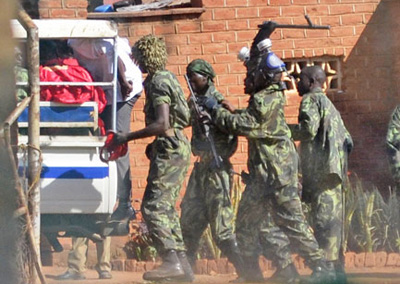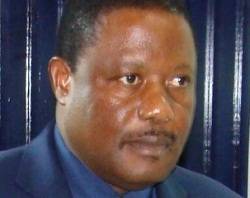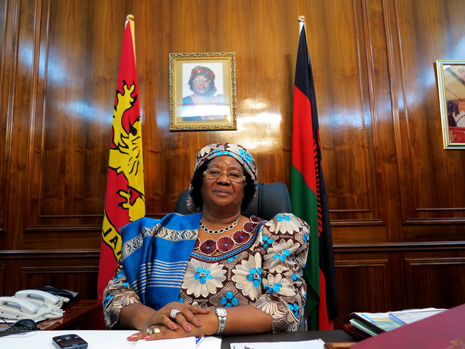President Joyce Banda has ordered police officers to “pinch” suspects in order to extract information from them.
She made the call at Sanjika in Blantyre yesterday after getting touched with details of how 51- year old banker Richard Nsamala of Soche East in Blantyre was murdered.
Banda was reacting to Assistant Commissioner of Police Paul Jeremiah’s confession that had the police considered respecting human rights as some sectors would want them to do, the suspects could not have revealed information about the crime.
“Do your job as police and no one would stop you from pinching the suspects for them to give out information; that’s why you are police officers,” said Banda, who hosted Village Headman Kadzuwa and his subjects, who helped the police apprehend the four men suspected to have murdered Nsamala.
However, Centre for Human Rights and Rehabilitation (CHRR) Executive Director Undule Mwakasungura yesterday urged Banda to protect the rights of all people including those who have offended the law.
“The police should work professionally. I am looking at the police who look at human rights as the centre of professionalism not to torture suspects.
“If you start giving police the green light to torture suspects, that is going to dent the image of the police as an institution and the entire government,” Mwakasungura said.
He said the police should ensure that they use professional means of getting information from suspects and not torture.
“Torture is prohibited under the international law and the country’s Constitution. The pinching is torture. The police will not pinch suspects, but will amplify it in many ways, including killing suspects. The solution is promoting professionalism,”
“Suspects have to give information at will, not to be tortured, the president should be in the forefront to protect people even when they have gone on the wrong side of the law,” Mwakasungura said.
Asked how the police would get information from suspects if the suspects are not willing to do so, Mwakasungura said the police need to acquire good skills, proper equipment and be well motivated so that they carry good investigations that can enable them get the right suspects and the right information to lead to suspects.
How Nsamala’s killers were caught
As details surrounding the murder of Nsamala allegedly championed by his houseboy Timothy Sinalo, 26, remain unclear, Kadzuwa and Jeremiah, who is Bvumbwe Police Officer-in-Charge, told the president how the suspects were discovered.
Kadzuwa said he knew about the arrival of his in-law Sinalo, who had driven to the village with three friends, from his sister at around six o’clock in the evening on August 20.
He said Sinalo claimed he had come to deliver cooking oil to his mother in-law but since his “newly bought car” had run out of fuel, he suggested that he park it behind a kitchen and that he would pick it up three days later.
Kadzuwa said the compound never believed Sinalo’s explanation, having known him not to have enough money to buy a car although he was living in town.
He said they, therefore, decided to interrogate Sinalo and his three friends.
He said Sinalo later changed his statement and said the vehicle belonged to the father of one of his three friends.
The village head said when pressed further, Sinalo tried to bribe Kadzuwa with K15,000 cash which he said he rejected.
Instead, Kadzuwa said he contacted Bvumbwe Police at around 10pm whom he said arrived at the scene in no time.
Police interrogation, confession
Jeremiah said when police arrived at the scene, they recovered three mobile phones and K15,000 from the suspects, whom he said still maintained that the car belonged to their friend’s father, Richard Nsamala.
He said the suspects told the police that Nsamala, whom they said was working for Indebank, was on leave but they failed to give his mobile phone number for the police to ask him if he knew the whereabouts of his vehicle.
When morning came and police contacted Indebank, Jeremiah said it confirmed that Nsamala was their employee and was on leave until August 31, 2012.
But when the police contacted Nsamala’s phone number which they acquired from the vehicle’s documents, they realised it was among the three recovered mobile phones which increased their suspicion.
The police then discovered that Nsamala had been missing along with his vehicle when they called his brother, using a phone number they got from one of the recovered phones.
When the brother went to Bvumbwe Police on the same day, he failed to recognise any of the four suspects except for his brother’s vehicle, according to Jeremiah.
Jeremiah said the police, the suspects and the brother went to Soche East where Nsamala was staying, but they found out that all his household items had been picked.
The suspects never revealed anything except that the two were just hired to drive them to the village, according to the police officer.
Come August 23, Jeremiah said the suspects— who had been in police custody at Soche Police— allegedly admitted having murdered Nsamala to get rich and that they had buried him within his compound.
They then led the police to the scene where they exhumed the body for post-mortem before burial on August 24, 2012. Post-mortem results are not yet out.
Jeremiah said had the police considered respecting human rights as some sectors would want them to do, the suspects could not have revealed how they murdered Nsamala.
JB’s thank you
Having listened to Jeremiah and Kadzuwa, President Banda said the details of the murder had touched her so much, herself being a woman and a mother.
In response to Jeremiah’s statement on human rights, Banda said the police should use all their expertise to squeeze out information from suspects.
“Do your job as police and no one would stop you from pinching the suspects for them to give out information; that’s why you are police officers,” Banda said.
She then donated about K200,000 cash, 10 bicycles and 10 solar lamps to community police of Bvumbwe.
She further appreciated the villagers, saying their suspicion and insistence to know the truth surrounding the vehicle exposed Nsamala’s death.
Banda also donated K10,000 to each of the villagers, about 200 in total, which he said should be their starter pack to buy fertiliser to encourage other communities to emulate their act.—Additional reporting by Daniel Nyirenda.




